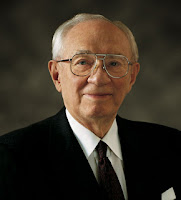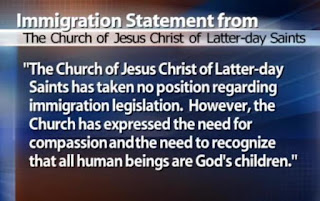Tuesday, January 29, 2008
Crossing The Bar
Sunset and evening star,
And one clear call for me!
And may there be no moaning of the bar,
When I put out to sea,
But such a tide as moving seems asleep,
Too full for sound and foam,
When that which drew from out the boundless deep
Turns again home.
Twilight and evening bell,
And after that the dark!
And may there be no sadness of farewell,
When I embark;
For tho’ from out our bourne of Time and Place
The flood may bear me far,
I hope to see my Pilot face to face
When I have crossed the bar.
(Alfred Lord Tennyson)
Labels:
Crossing the Bar,
death,
poetry and prose,
Tennyson
Sunday, January 27, 2008
President Gordon B. Hinckley dies at age 97
 From deseretnews.com - LDS Newsline
From deseretnews.com - LDS NewslinePresident Gordon B. Hinckley, who led The Church of Jesus Christ of Latter-day Saints through explosive growth during his more than 12 years as president, died at 7 p.m. today of causes incident to age, surrounded by family. He was 97.
Church newsroom articles on President Hinckley
A good collection of media articles and comments at Guy Murray's Messenger and Advocate blog.
Numerous other articles and comments throughout the Bloggernacle.
A beautiful quote from President Hinckley, cited in a Salt Lake Tribune article --
"I am an old man given to meditation and prayer. I would enjoy sitting in a rocker, swallowing prescriptions, listening to soft music, and contemplating the things of the universe. But such activity offers no challenge and makes no contribution.
"I wish to be up and doing. I wish to face each day with resolution and purpose. I wish to use every waking hour to give encouragement to bless those whose burdens are heavy, to build faith and strength of testimony. If in the process I should die on some distant strand while speaking to my friends in the church, it would be better than if I were to spend my days, looking out languidly upon the world without purpose or design." April 5, 1997
In President Monson's closing address of Hinckley's funeral, he related an incident where President Hinckley's doctor tried to get Monson to persuade Hinckley to actually use his cane for walking. Monson reports his reply -- "I am his counselor. You are his doctor. You tell him!".
Another anecdote from a Salt Lake Tribune reader --
At the centennial scout jamboral in Filmore, Gordon B. Hinckley was presented with a walking stick from the scouts. His quip was, "Thanks! I might need this when I get old!"
Overall impression from the funeral speakers was of the deeply felt the loss of a great man, and a great friend.
Though he was born in a different era, he truly was a man for our times.
His countenance seemed to soften with age, a fine patina formed through years of time. Weathered by long experience, afflicted with disease, he nonetheless maintained a remarkable resilience. He was well characterized by Elder Eyring, in his farewell address to President Hinckley, with the optimistic phrase that summarized his world-view: "Things will turn out all right. They always do."
As with all of us, President Hinckley's greatest legacy was established in his simple resolve to carry forth the Lord's work. He delivered no sweeping new revelations, unravelled no gordian-knot mysteries of doctrine, invented no brilliant innovations. Rather, he faced forward with firm resolve to build upon and follow through with established plans, strengthening the programs of the Church, and welcoming the throngs of new converts that continue to come in an overwhelming tide.
His steadfast example will be missed, as will his indomitable good humor.
Wednesday, January 23, 2008
Deseret News: Orson Scott Card on Ambition
An outstanding Orson Scott Card editorial, "Sorting out the right and wrong of ambition", Deseret News, Thursday, Jan. 17, 2008


RIGHTEOUS AMBITION is to be an active part of something greater than yourself, a community of good people doing good.
To be anxiously engaged in a good cause...
[T]he Lord honors the ambitious Stewards, the ones who take what they are given and magnify it, with the goal of returning it to the Lord with thanks.
Political Musings II -- LDS Church and Utah Legislature
According to the article,
LDS Church leaders have told legislative bosses that the "element of humanity" should be re-introduced to the state's immigration debates...
House Minority Whip David Litvack, D-Salt Lake, said the Democrats' meeting with church officials brought up several issues, but the immigration discussion was the most touching for him personally.
"I interpreted what was said as this: 'Take a step back, be calm, and above all remember that we are dealing with human beings here,"' said Litvack, who is Jewish and has himself called for cooler heads in dealing with the often emotional issue of illegal immigration...
LDS Church officials "used the word 'call,' they made a call for humanity in immigration" debates and legislation, Litvack said. "We should not demonize" illegal immigrants. "In some cases, the debate has become so ugly, I heard, so hateful and dehumanizing. Let's bring back the element of humanity."
The worldwide church has many Hispanic and Latino members, and the church's missionaries in Latin America are some of the most successful in getting new converts to the church.
Across America, but especially in the West, the tone of immigration debates has, at times, turned harshfully critical of immigrants and of the politicians arguing for what they term reasonable immigration laws.
Especially in the Republican presidential contest, immigration hard-liners have been pushing for tough new laws and policies.
More on this last assertion, from author Orson Scott Card -- "A Moderate Democrat's Open Letter to Republicans: Please Don't Throw Away This Election," Ornery.org, 6 Jan 2008.
I'm writing this on the Monday before the New Hampshire primary. I don't know the outcome, but the news today is all about Obama drawing bigger crowds than Clinton, and about how Mitt Romney's tough stand on illegal immigration in the debate is swinging Republican voters strongly toward him and away from McCain and Huckabee.
Smart move, Mitt.
For the moment.
But in the long run, if illegal immigration becomes the main issue on which a Republican secures his party's nomination, it is a potential disaster -- for the Republican Party and for the country...
Many Republicans are fond of saying that America is a Christian country. They claim to believe that we are all sinners, dependent on the mercy and forgiveness of Christ.
Which is why I'm baffled that so many of the same folks are grimly determined to deny any chance of amnesty -- a synonym for forgiveness or pardon -- to people whose crime is only a crime because a law we could easily change declares it so.
Americans may let themselves get hot under the collar about immigration, especially when demagogues exaggerate and misrepresent the "threat" of illegal immigrants.
But in the voting booth, most Americans consult their consciences. Most Americans will not vote for a candidate whose platform is built on hate and fear of strangers...
Of course, I might be wrong, and you might win with an anti-Mexican-immigrant platform. But I would not find that reassuring.
I don't want to live under shari'a -- but I also don't want to live under a government that drives hard-working parents and their children out of our country at the point of a gun, all for the crime of doing what it took to feed their families.
Another link to a local news article relating to this issue, on KSL...
"Religious groups weighing in on immigration issue", KSL.com, 24 Jan 2008.

Thursday, January 17, 2008
Legalizing -- bad idea


Supporters of a certain candidate in the current political campaigning have been talking up the issue of legalization of illegal drugs. Some of these self-identified "libertarians" scoff about comparing the potential harmful effects of marijuana against the known evil consequences of alcohol abuse.
We are compelled to make that comparison, obviously, because it is useful.
How could we reasonably expect that legalized marijuana would have a more benign social impact than legalized alcohol?
At one time, the people of this society supported a ban on alcohol. But it proved to be unpopular for reasons other than the fact that the consumption of alcohol has serious negative consequences. I suggest that the biggest reason prohibition failed is because it foiled Satan's purpose to ensnare us in evil habits.
In any case, it seems rather specious to argue for legalization on the basis that marijuana might prove somewhat less harmful than legalized alcohol.
Let's also not pretend that legalizing this stuff is a new idea. I was listening to the same arguments before I was in high school, and they were not new then.
There is always a running debate about whether civil law should attempt to "legislate morality". The root of this argument is itself suspect, since laws must be based in moral values, or they aren't worth much.
Creating laws that proscribe socially costly or damaging behavior has no effect on free agency. Free agents always have the ability to make their own choices. In the case of behavior that is illegal, those making a choice have added incentive toward legal alternatives. But they can still choose for themselves.
A free society does not exist in a moral or legal vacuum. In a perfectly ordered society, perfectly preserving personal freedom, everyone would voluntarily obey the laws, because we would all have the knowledge and understanding that these laws are based on correct principles.
I find the argument that legalized marijuana might be somewhat less damaging than alcohol to be less than compelling. I could argue with just as much enthusiasm that legalized machine guns would inflict less damage than legalized tactical nukes. Not a convincing rationale, either way.
I think the facts are unmistakably clear. Substances containing drugs with side-effects that alter perception or impair judgement are not suitable for legalized unrestricted consumption. We're all fully aware that the most damaging social impact from alcohol consumption has nothing to do with livers or stomachs.
As I see it, there are two obstacles which must be overcome in order to legitimize marijuana use. First, to prove that the net benefit is greater than any possible negative impact and social cost. And second, to insure that control and marketing of marijuana products don't follow the same track as, say, historical tobacco products.
A bit of additional appropriate sermonizing...
Quoting from Glenn L. Pace,"They're Not Really Happy," Ensign, Nov 1987, 39
Activities always forbidden by the Lord and for many years frowned upon by society are now accepted and promoted by that same society. The media serves up these activities in such a fashion as to make them look very desirable. Add to acceptability and desirability the power of peer pressure, and you have an extremely explosive situation.
Lehi’s vision of the tree of life is appropriate for our day. In that vision, he saw a great and spacious building, which represents the pride and temptations of the world:
“And I … beheld … a great and spacious building; …
“And it was filled with people, both old and young, … and their manner of dress was exceedingly fine; and they were in the attitude of mocking and pointing their fingers towards those who … were partaking of the fruit” (1 Ne. 8:26–27).
Even though you have a testimony and want to do what is right, it is difficult not to be drawn to the great and spacious building. From all appearances, the people in the building seem to be having a great time. The music and laughter are deafening...
They look happy and free, but don’t mistake telestial pleasure for celestial happiness and joy. Don’t mistake lack of self-control for freedom. Complete freedom without appropriate restraint makes us slaves to our appetites. Don’t envy a lesser and lower life.
An interesting side note -- In today's news it was announced that the Church officially supports a measure proposing to remove certain alcoholic beverages from the list of those approved for sale at grocery and convenience stores, "that the sale of distilled spirits....should be restricted to state liquor stores." Commentary in the Deseret News and the Salt Lake Tribune.
Political musings...

Does it matter very much if I know that my favorite political candidate cannot win the office he is running for? In discussion I have heard it said that voting for an unelectable candidate seems like an empty gesture.
I have given much thought to this idea over the past couple of years. In part, because some of my associates express such strong feelings of contempt for that very notion. Perhaps this would be an interesting topic to develop further.
I've had to ask myself, what difference does it make, then, if my vote is wasted? Apparently I have wasted it anyway, voting for a candidate that I don't really want, who just seems to be the least awful alternative.
In an ideal situation, we would be presented with at least one good choice. I cannot recall that happening in the national political scene, not for a very long time.
We hear it said from time to time that the Founding Fathers believed in a caste system - those with education and land, versus those that do not. If you did not own land, you could not vote. If you were black or a woman, you could not vote.
I think this premise is subject to reasonable debate.
I would not characterize the colonial voting rules as a "caste" system -- unless you consider rules for establishing a certain minimum level of social responsibility as a way of imposing caste levels. The colonists were concerned that voters would be invested with an important measure of political power and influence. They were hesitant to extend this power to the uninformed, uninterested, or irresponsible.
The Founding Fathers apparently saw cause for imposing a rational check on voting entitlement. The property ownership requirement was calculated to eliminate casual voters. Women were vested through their spouses vote.
Who can say that today's system works better?
One of the more specious challenges in debating about national involvement in war is the assertion that they are somehow less than legitimate for being absent an "official declaration of war" from Congress.
Seems like quite a few armchair quarterbacks get really perturbed about this point. Isn't that sorta drawing a fine line, since most US Presidents and Congresses have largely ignored the absolute formality? I would have guessed that most of us know when we're at war because the Congress votes to fund the military action, thus giving tacit approval.
I've wondered a number of times, hearing this complaint, if perhaps the stricter meaning you're using isn't just a sort of political gripe, to be used when you want to find fault with someone you don't like.
Obviously, many Presidential administrations and Congressional constituencies do not subscribe to this specifically nuanced interpretation of the Constitution. Though in most instances, national "war" standing was ratified by the Congress, a formal document titled "US Congress Declaration of War" has seldom been issued.
Perhaps those who argue so can explain further why Constitutional policy should operate as they insist. Their interpretation seems to be at odds with most of those involved in actions directly related to this issue. As far as I can tell, the issue has never even been tested in the Supreme Court, which seems like the appropriate place to address such concerns, if anyone felt it was such a vital point.
Claiming the moral high ground in this instance does not seem very efficacious. To me it seems this argument has overburdened Article 1 Section 8 with arbitrary extra meaning that it does not contain, and perhaps never has. Proponents of the contrary bear the obligation to demonstrate proof of culpability of US Governments from historical precedent. According to my understanding, this is how US law and government work. Even the earliest practitioners of Constitutional procedure -- e.g. John Adams -- did not consider any specific formal Congressional declaration to be necessary. The issue has never been tested in the US Supreme Court, where Constitutional interpretation is properly adjudicated. That fact in itself indicates that any arbitrary application of "illegal" in this sense is stretching the issue.
By tradition, the President informs the Congress and obtains approval and support for waging war. This satisfies the "declaration" requirement. Current practice has been going on for hundreds of years. Now suddenly, some have noticed that if we nuance the interpretation of Article 1 a certain way, it would seem to indicate that long-standing tradition violates the strictest Constitutional mandate.
In reality, the textual document of the US Constitution actually contains very little specific information. Most of the practices that have evolved as a result of Constitutional interpretation are based on extraneous doctrine -- assumptions about interpretation, development of traditions and customs, general consensus, and formal legal challenges through the Supreme Court where there is disagreement.
Thus, I would assert that there is little basis for arguing that this is any kind of serious violation -- certainly not worth considering as an impeachable offense.
Nowhere can I find in the US Constitution where it says that the Congress must sit down and write out a piece of paper containing the assertion, "We hereby formally declare war". Nor is any other specific requirement iterated, other than the stipulation for "declaration of war".
Unless it can be established by historical example or logical argument that the current practice varies somehow from the traditional interpretation and application, I think the case carries no weight. I expect that actions of the members of US government, as practiced since the very founding of the Constitution, do reflect what those men believed to be the intent and will of the original framers. From the very beginning, the office of the President has had responsibility to formally identify challenges to the sovereign status of the country, to deploy responding military forces, and to alert the Congress of these threats. The Congress has traditionally ratified acts initiated by the President -- by title, the "Commander in Chief" of the US military.
Sometimes that ratification has taken the form of "rubber stamping". Other times, Congress has enjoined very lively debate about the President's actions, which have certainly had significant impact on how the President conducted war.
In current practice, the Congress is the primary oversight authority, and has responsibility to regularly approve deployment and funding of our military. This is far more interactive and regulatory than any mere issuing of a formal document of "declaration".
Wednesday, January 16, 2008
Political discord
 Allow me to preach a bit of repentance here. Feel free to read into it whatever you feel is appropriate.
Allow me to preach a bit of repentance here. Feel free to read into it whatever you feel is appropriate.I cannot imagine what it is about political discussions that seems to make otherwise perfectly nice people suddenly become mentally unstable, abusive, and emotionally volatile. This phenomenon, the tendency to segregate into angry groups that incubate nothing but growing polarized animosity toward others of different views, jeopardizes every legitimate claim we might make on aspiring to become the Lord's Zion people. If we pursue our personal ends under such tactics, I am certain the Lord will disclaim us and the fruits of our efforts.
Our model in such instances ought to follow the example of inspired leaders, none of whom resort to public censure or harsh personal invective to convey the message. They teach correct principles, and good government is the inevitable result.
Perhaps a quick review of President Benson's speech on pride would be an appropriate reminder.
The central feature of pride is enmity--enmity toward God and enmity toward our fellowmen. Enmity means "hatred toward, hostility to, or a state of opposition." It is the power by which Satan wishes to reign over us.
The proud make every man their adversary by pitting their intellects, opinions, works, wealth, talents, or any other worldly measuring device against others.
The scriptures testify that the proud are easily offended and hold grudges. (See 1 Ne. 16:1-3.) They withhold forgiveness to keep another in their debt and to justify their injured feelings.
Let us choose to be humble.
We can choose to humble ourselves by conquering enmity toward our brothers and sisters, esteeming them as ourselves, and lifting them as high or higher than we are. (See D&C 38:24; D&C 81:5; D&C 84:106.)
We can choose to humble ourselves by forgiving those who have offended us. (See 3 Ne. 13:11, 14; D&C 64:10.)
Let us choose to be humble. We can do it. I know we can.
Ezra Taft Benson, “Beware of Pride,” Ensign, May 1989, 4
Defining the "mainstream"

The essential "mainstream" of the Church is defined by the current leadership and teachings. We follow the example of the brethren, the living oracles of God. There is no dearth of counsel on this subject.
An example, from an address by Elder Eyring:
Henry B. Eyring, "A Life Founded in Light and Truth," Ensign, Jul 2001, 6
Here is President Joseph F. Smith's description of the work it takes to build an imperishable foundation of truth:
"The men and the women who are honest before God, who humbly plod along, doing their duty, paying their tithing, and exercising that pure religion and undefiled before God and the Father, which is to visit the fatherless and the widows in their afflictions and to keep oneself unspotted from the world, and who help look after the poor, and who honor the holy Priesthood, who do not run into excesses, who are prayerful in their families, and who acknowledge the Lord in their hearts, they will build up a foundation that the gates of hell cannot prevail against; and if the floods come and the storms beat upon their house, it shall not fall, for it will be built upon the rock of eternal truth" (Gospel Doctrine, 5th ed. [1939], 7-8).
President Smith made building on a foundation of truth sound like a long list of things to do. He seems to be describing work. I remember President Ezra Taft Benson saying with a smile about his service, "I love this work. And it is work."
Yet you will notice that the work is simple obedience. It is not complicated things; it is not fancy things or getting great spiritual manifestations. This is work within the abilities of the most humble and the least educated.
It sounds so simple to build upon a foundation of truth that you may wonder why everyone doesn’t succeed. For one thing, it takes great humility. It’s hard to repent, to admit you are wrong on faith alone, before the evidence of a feeling of being forgiven and light comes. But that is the way it has to be. First comes obedience and then come the confirming assurances, the revelation of truth, and the blessing of light.
Words of American Patriots
From Abraham Lincoln's Gettysburg Address --


...in a larger sense, we can not dedicate—we can not consecrate—we can not hallow—this ground. The brave men, living and dead, who struggled here, have consecrated it, far above our poor power to add or detract. The world will little note, nor long remember what we say here, but it can never forget what they did here. It is for us the living, rather, to be dedicated here to the unfinished work which they who fought here have thus far so nobly advanced. It is rather for us to be here dedicated to the great task remaining before us—that from these honored dead we take increased devotion to that cause for which they gave the last full measure of devotion—that we here highly resolve that these dead shall not have died in vain—that this nation, under God, shall have a new birth of freedom—and that government of the people, by the people, for the people, shall not perish from the earth.
Tuesday, January 15, 2008
Apostasy in the Church

Elder Faust's general conference address is the classic definition --
James E. Faust, "Keeping Covenants and Honoring the Priesthood"
Ensign, Nov 1993, 36
Free discussion and expression are encouraged in the Church. Certainly the open expressions in most fast and testimony meetings, or Sunday School, Relief Society, and priesthood meetings attest to that principle. However, the privilege of free expression should operate within limits. In 1869, George Q. Cannon explained the limits of individual expression:
"A friend ... wished to know whether we ... considered an honest difference of opinion between a member of the Church and the Authorities of the Church was apostasy. ... We replied that ... we could conceive of a man honestly differing in opinion from the Authorities of the Church and yet not be an apostate; but we could not conceive of a man publishing these differences of opinion and seeking by arguments, sophistry and special pleading to enforce them upon the people to produce division and strife and to place the acts and counsels of the Authorities of the Church, if possible, in a wrong light, and not be an apostate, for such conduct was apostasy as we understood the term" (Gospel Truth, sel. Jerreld L. Newquist, 2 vols., Salt Lake City: Deseret Book Co., 1974, 2:276-77).
Among the activities considered apostate to the Church include when members "(1) repeatedly act in clear, open, and deliberate public opposition to the Church or its leaders; (2) persist in teaching as Church doctrine information that is not Church doctrine after being corrected by their bishops or higher authority; or (3) continue to follow the teachings of apostate cults (such as those that advocate plural marriage) after being corrected by their bishops or higher authority" (General Handbook of Instructions, 1989, p. 10-3).
Those men and women who persist in publicly challenging basic doctrines, practices, and establishment of the Church sever themselves from the Spirit of the Lord and forfeit their right to place and influence in the Church. Members are encouraged to study the principles and the doctrines of the Church so that they understand them. Then, if questions arise and there are honest differences of opinion, members are encouraged to discuss these matters privately with priesthood leaders.
There is a certain arrogance in thinking that any of us may be more spiritually intelligent, more learned, or more righteous than the Councils called to preside over us. Those Councils are more in tune with the Lord than any individual persons they preside over, and the individual members of the Councils are generally guided by those Councils. In this church, where we have lay leadership, it is inevitable that some will be placed in authority over us who have a different background from our own. This does not mean that those with other honorable vocational or professional qualifications are any less entitled to the spirit of their office than any other. Some of the great bishops of my lifetime included a brickmason, a grocer, a farmer, a dairyman, and one who ran an ice cream business. What any may have lacked in formal education was insignificant. They were humble men, and because they were humble, they were taught and magnified by the Holy Spirit. Without exception, they were greatly strengthened as they learned to labor diligently to fulfill their callings, and to minister to the Saints they were called to preside over. So it is with all of the callings in the Church. President Monson teaches us, "Whom the Lord calls, the Lord qualifies" (Thomas S. Monson, Ensign, May 1988, p. 43).
A couple of formal terms that benefit from a bit of elaboration --
"Special pleading" is a specific reference to a type of logical fallacy. A good general discussion of this topic in Wikipedia .
"Sophistry" refers to a specious argument specifically intended to deceive. A sophism might be crafted to appear logical though actually wrong, could use difficult words and complicated sentences to intimidate the audience, or it might exploit an audience's known prejudices and emotions.
.
Church Policy: Political Neutrality

As aspiring disciples of Jesus Christ, it would do us well to keep in mind the very well known Church public policy on political neutrality. There is inspired wisdom and long experience behind this policy. This policy is summarized in a statement at the LDS.org newsroom:
Political Neutrality.
The Church's mission is to preach the gospel of Jesus Christ, not to elect politicians. The Church's neutrality in matters of party politics applies in all of the many nations in which it is established.
The Church does not:
* Endorse, promote or oppose political parties, candidates or
platforms.
* Allow its church buildings, membership lists or other resources
to be used for partisan political purposes.
* Attempt to direct its members as to which candidate or party
they should give their votes to. This policy applies whether or not a
candidate for office is a member of The Church of Jesus Christ of
Latter-day Saints.
* Attempt to direct or dictate to a government leader.
The Church does:
* Encourage its members to play a role as responsible citizens in
their communities, including becoming informed about issues and voting
in elections.
* Expect its members to engage in the political process in an
informed and civil manner, respecting the fact that members of the
Church come from a variety of backgrounds and experiences and may have
differences of opinion in partisan political matters.
* Request candidates for office not to imply that their candidacy
or platforms are endorsed by the Church.
* Reserve the right as an institution to address, in a nonpartisan
way, issues that it believes have significant community or moral
consequences or that directly affect the interests of the Church.
Ameliorating the consequences

A popular aphorism, from the title of one of the LDS Hymns collection -- "Do what is right, let the consequence follow".
I offer some hopefully thoughtful reflection on this idea.
It is consistent with inspired counsel that we are constantly to conduct ourselves as wise stewards. We must do all we can to consider the implications of actions that affect our own life, and the lives of others. Utmost in our priorities, it is imperitive to be guided by correct principles, in order to let our thoughts and actions be guided by inspiration from Heavenly Father.
Doing what is right, however, never gives us license to flagrantly act in defiance or willful igorance of the consequences. Thus our attitude can never rightly be, "Damn the torpedos, full speed ahead". We cannot flagrantly ignore adverse repercussions that might have been avoided.
Just as weighty as our obligation to choose right, is the responsibility to ensure that we cause no avoidable harm.
The Savior's admonition
Behold, I send you forth as sheep in the midst of wolves: be ye therefore wise as serpents, and harmless as doves. (Matthew 10:16).
Whosoever therefore shall humble himself as this little child, the same is greatest in the kingdom of heaven.
And whoso shall receive one such little child in my name receiveth me.
But whoso shall offend one of these little ones which believe in me, it were better for him that a millstone were hanged about his neck, and that he were drowned in the depth of the sea. (Matthew 18:4-6).
Respecting the feelings and opinions of others is not necessarily an act of deplorable cowardice. Circumspection and self-control are not personal characteristics of the "lily-livered". Even Jesus Christ tempered His speech and teachings in such a manner that generally reflected a calm and peaceful demeanor. He was rarely threatening, derogatory or harsh. In those instances where He did take such dramatic action, it was only against the most bitter of evil enemies.
With His closest disciples, presumably chosen friends, Jesus seemed to be ever mindful of the patient, teaching approach. Though he was even surely aware that one of his chosen twelve would eventually betray Him, yet He did not opt to cast that man out.
Labels:
admonition,
contention,
example,
Jesus,
wise servants
Monday, January 14, 2008
Words of American Patriots
An excerpt from a Franklin Delano Roosevelt address, delivered to the American people, December 8, 1941.

Always will we remember the character of the onslaught against us.
No matter how long it may take us to overcome this premeditated invasion, the American people, in their righteous might, will win through to absolute victory.
I believe I interpret the will of the Congress and of the people when I assert that we will not only defend ourselves to the uttermost but will make very certain that this form of treachery shall never endanger us again.
Hostilities exist. There is no blinking at the fact that our people, our territory, and our interests are in grave danger.
With confidence in our armed forces with the unbounded determination of our people we will gain the inevitable triumph so help us God. (FDR speech)
Subscribe to:
Posts (Atom)


